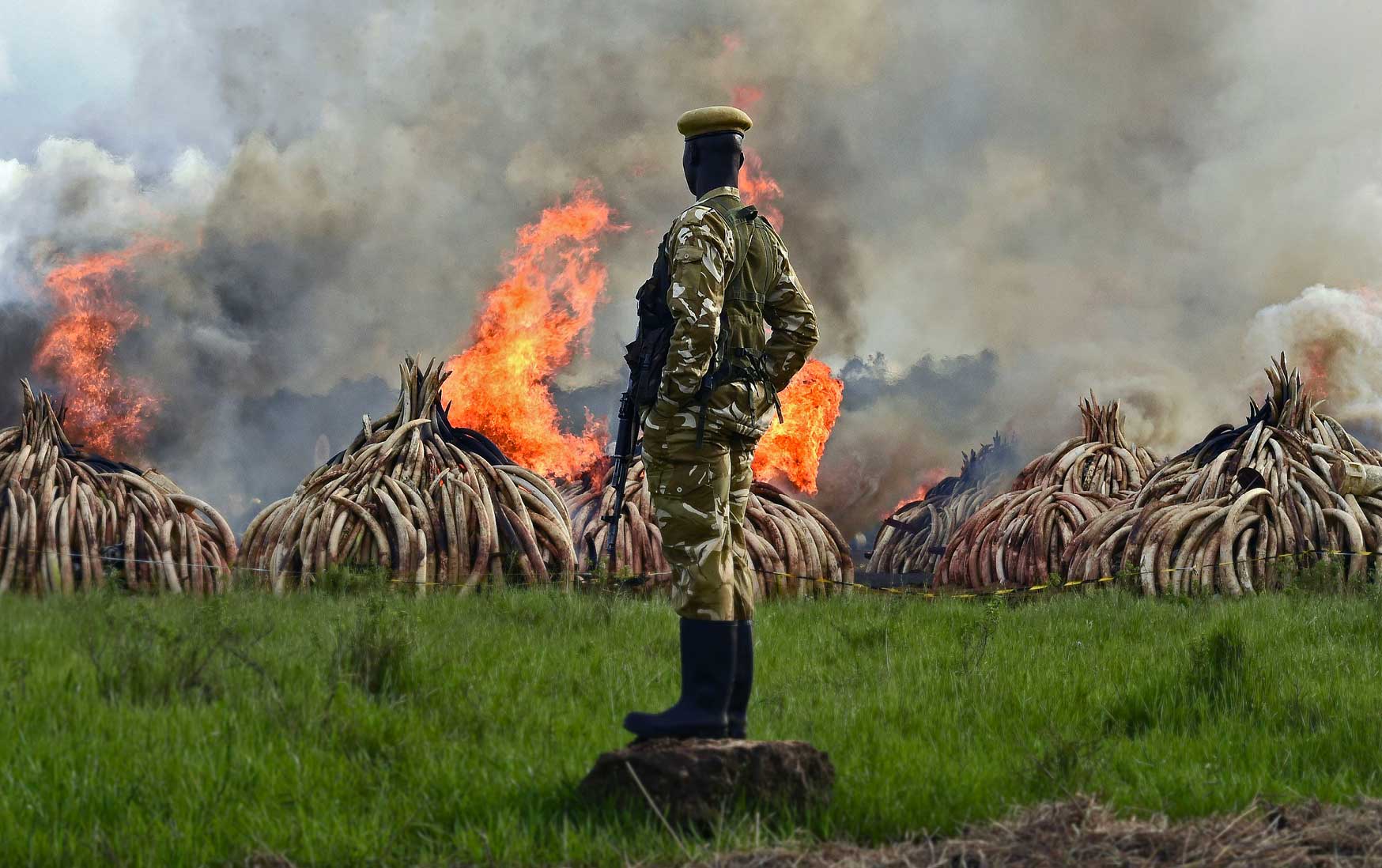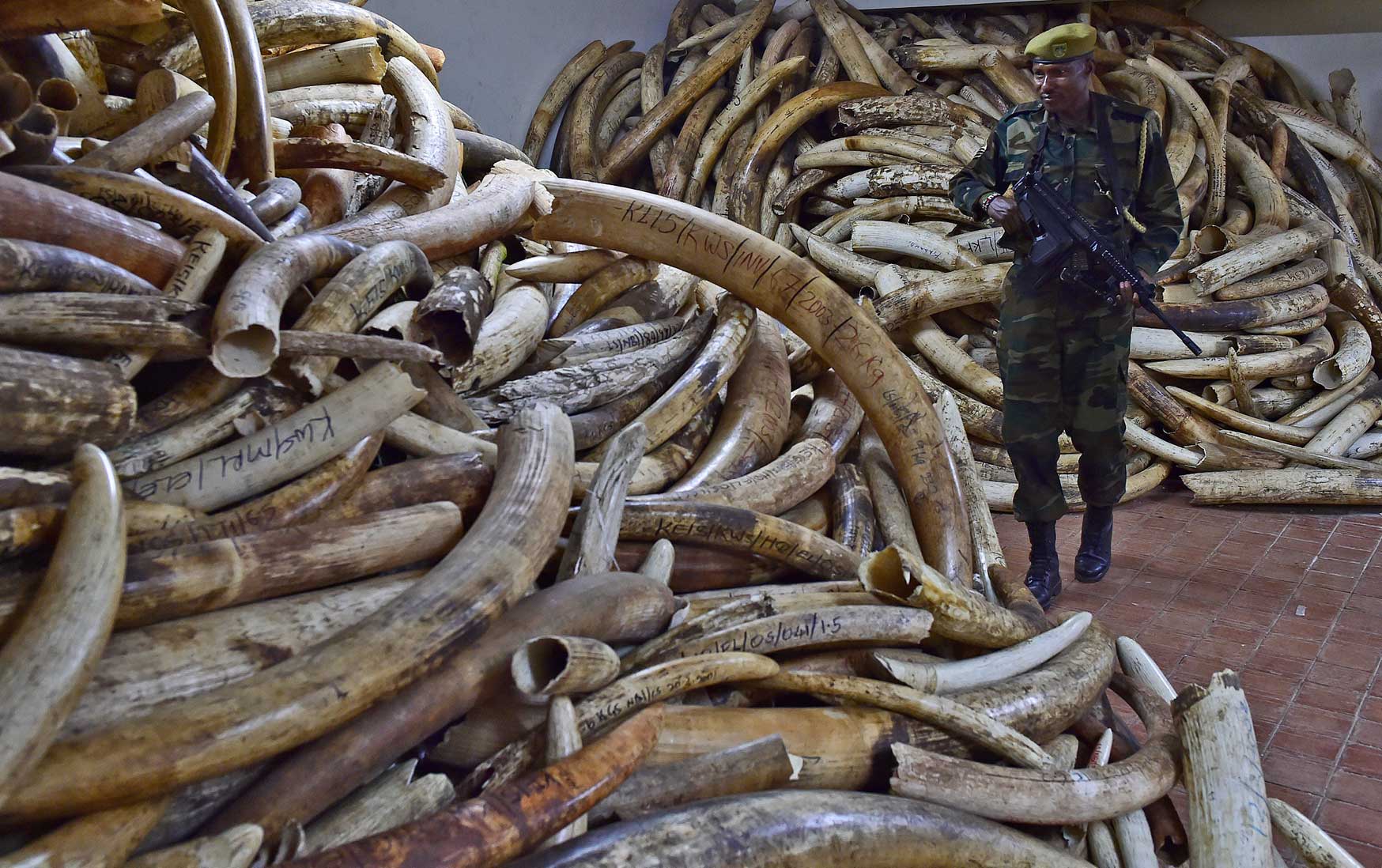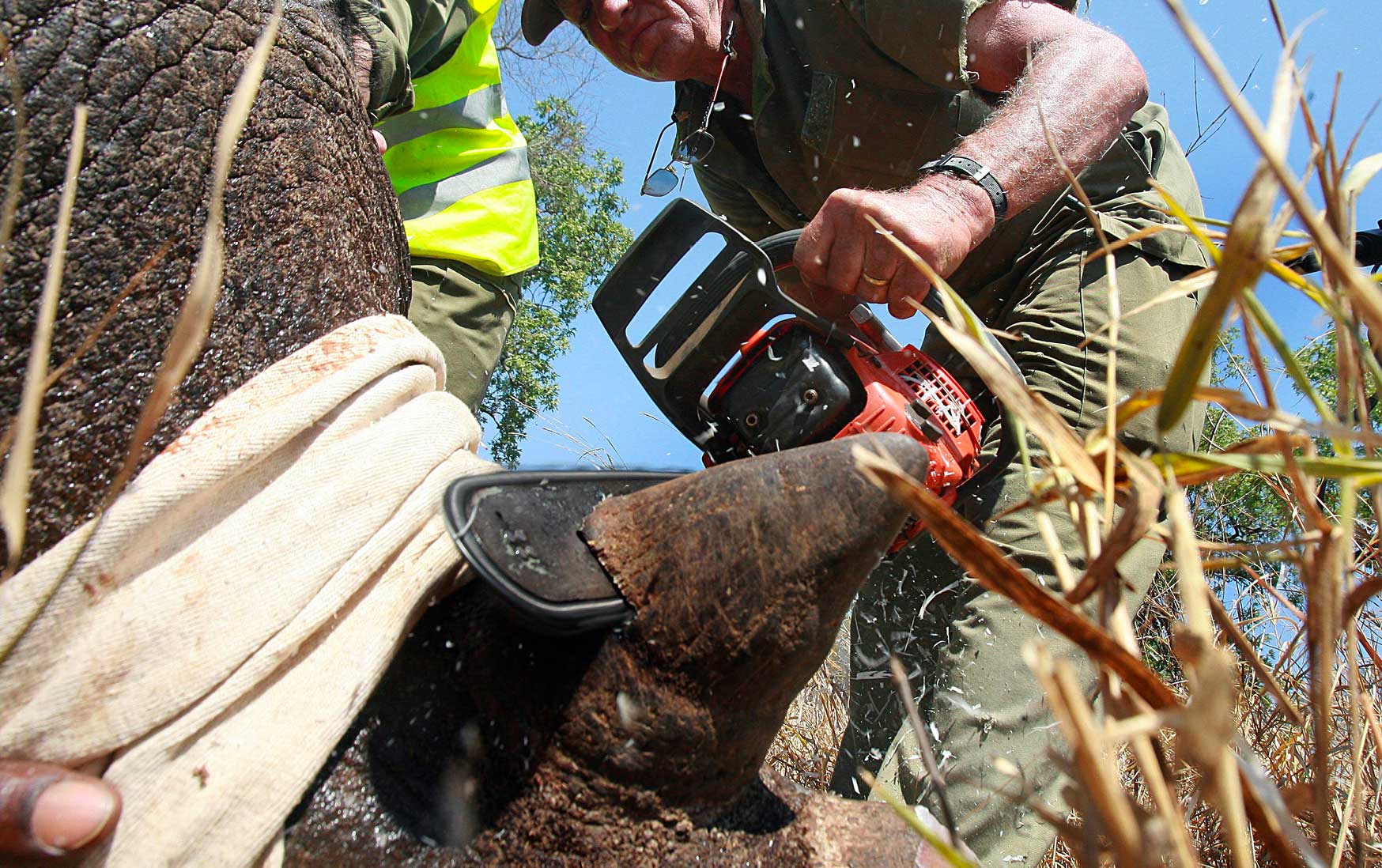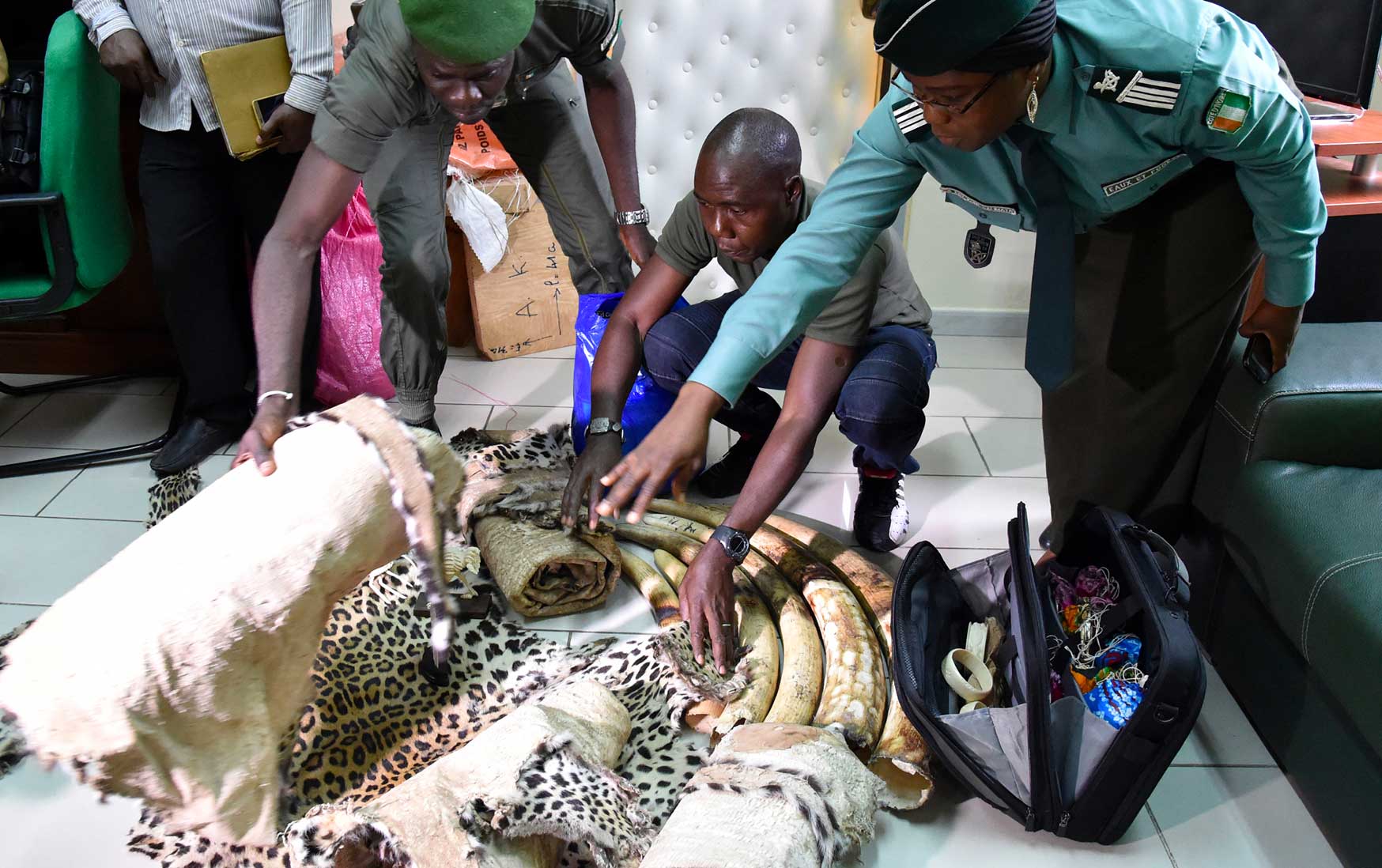Every year Africa loses $50 billion in illicit financial flows. This represents a huge lost opportunity in funds for economic investment in jobs, poverty, inequality and climate change. It then becomes imperative to detect, trace and recover this money.
At least a third of these illegal financial flows (IFFs) are attributed to the trade of wildlife species perpetrated by criminal syndicates. Wildlife crime is now considered a lucrative black-market trade on a par with drugs, arms and human trafficking in scope and profit. These criminal syndicates rely on a system of weak controls and governance systems to perpetrate wildlife crime in source, transit and destination countries, undermining the rule of law while endangering more than 7,000 wild species.

A Kenya Wildlife Services ranger watches as illegal stockpiles of elephant tusks, ivory figurines and rhinoceros horns burn at the Nairobi National Park in April 2016. Photo: Carl De Souza/AFP
Illicit financial flows (IFFs) refer to the movement of illegally obtained money across borders. In the context of wildlife crime, these IFFs occur to facilitate poaching, the purchase of wildlife products and enabling their trafficking across borders. Wildlife crime syndicates move, hide, and launder the profits and proceeds of wildlife crime through various means, undermining the financial integrity of both financial and non-financial systems.
These syndicates also engage and diversify into other forms of serious crime such as corruption and money laundering. For example, recent large-scale elephant ivory seizures mixed with shipments of other protected species indicate that wildlife crime syndicates have diversified into multiple environmental crimes. They rely on local facilitators (“fixers”) in source countries to extract wildlife – intermediaries to transport shipments, and a network of complicit and compromised law enforcement officials across source, transit and destination countries to avoid detection.
Wildlife crime syndicates rely on illegal financial flows to transfer money to poachers and middlemen, to bribe law enforcement officials and to hide the profits of crime. The convergence of wildlife crime with other serious crimes such as fraud, corruption and money laundering provides further evidence of the seriousness of organised wildlife crime.

A Kenya Wildlife Services ranger walks through a secure ivory stock room in Nairobi. Photo: Carl De Souza/AFP
Wildlife crime syndicates exploit financial and non-financial systems, including formal banking systems, the luxury goods trade, money value transfer systems and front businesses. Wildlife crime syndicates often exploit weaknesses in formal banking systems to obscure their transactions. They place and layer funds through deposits of cash under the guise of formal payments or use electronic bank payment services tied to a bank account or credit card. For this reason, formal banking entities must undertake customer due diligence (Know your customer [KYC]) to establish and verify business relationships. It is expected that these entities would then track and report suspicious transactions to yield actionable financial activity information for law enforcement.
Wildlife traffickers also use informal money value transfer systems such as hawala, fei-chien and hundi for instantaneous transactions. These money value transfer systems are facilitated by a network of dealers and brokers in different countries who move money to facilitate international transfers without currency physically moving across borders. These alternative remittance systems are anonymous with no transaction trail and often operate in an environment with little regulation or no oversight.
These criminal syndicates also exploit weak corporate governance regulations to incorporate shell and front companies that obfuscate illegal activity. Some front companies engage in export and import trading to conceal large payments across borders. Other front companies are incorporated through a patchwork of opaque financial structures with multiple layers of ownership – as anonymous companies or secrecy jurisdictions (the Tax Justice Network describes secrecy jurisdictions as “providing facilities that enable people or entities to escape or undermine the laws, rules and regulations of other jurisdictions elsewhere”) .

De-horning rhinos to make them less vulnerable to poaching in Chipinge National Park, Zimbabwe. Photo: Desmond Kwande/AFP
These companies often take advantage of legal wildlife trade businesses such as breeding facilities and zoos to facilitate illegal trade. They also take advantage of the legitimate wildlife trade to co-mingle licit and illicit proceeds which potentially present a challenge to detecting illegal activity. This indicates that company trading data relating to business and tax reporting is key in identifying wildlife crime IFFs.
Syndicates often buy high-value goods such as artwork, jewellery, and real estate to launder the proceeds and profits of wildlife crime. This demonstrates the important role that non-financial sectors and their professionals such as realtors, attorneys and precious stones dealers can play in identifying, detecting and reporting suspicious transactions linked to the illegal wildlife trade.
Syndicates also use gift cards that can be exchanged for the specific cash value of goods and services from businesses. For example, the South African Directorate for Priority Crime Investigation (the Hawks) disrupted a wildlife crime syndicate and seized $1 million in iTunes prepaid cards used to transfer illicit proceeds.
Despite the billions of dollars lost to wildlife crime, law enforcement rarely focuses on the financial aspect of this crime. Illegal wildlife and products are regularly seized but the arrest – and prosecution – of these criminals for money laundering-related offences is extremely rare. This represents a major missed opportunity to identify and pinpoint the high-level individuals and financiers involved and to disrupt the profitability of this crime. In many countries, money laundering offences attract more severe penalties than wildlife crimes, indicating that these criminals could avoid stiffer penalties because financial investigations are not conducted.

Wildlife and hunting resources officers of Côte d’Ivoire’s Ministry of Water and Forests with seized elephant tusks and panther skins destined for the Asian market. Photo: Issouf Sanogo/AFP
Fortunately, there are signs that African law enforcement responses to IFFs are strengthening. High-level political commitment and goodwill against IFFs have developed, with most nations in Africa cooperating on improving international and regional tax cooperation, mutual legal assistance, investigation and information sharing among law enforcement agencies.
Most African jurisdictions have also promulgated anti-money laundering laws, made wildlife crime a predicate offence, triggering money laundering investigations. These laws, especially in South Africa, Botswana, Kenya, and Tanzania have penalties for money laundering offences and treat wildlife crime as a serious offence. African jurisdictions have also created financial intelligence units (FIUs) and asset recovery agencies (ARAs), which are empowered to track financial flows, identify criminal syndicates, detect suspicious transactions, and investigate and support prosecutions for money laundering offences.
African governments are also now working with state and non-state actors to build law enforcement capacity to respond to IFFs. This cooperation includes training focused on providing law enforcement with technical skills and best practices in handling financial investigations in wildlife crime cases. In applying “following the money” investigative approaches, law enforcement can target wildlife crime syndicates, identify and trace IFFs and forfeit and recover the financial profits of wildlife crime.
Money laundering is the soft underbelly of the illegal wildlife trade. Criminal syndicates are attracted to high-profit and low-risk criminal activities making it imperative to use financial intelligence to disrupt them. I have a dream that one day wildlife law enforcement will be funded by money recovered from wildlife crime. However, that dream can only be achieved when financial investigations are made to recover profits associated with illegal wildlife crime. By targeting the profits earned by wildlife crime syndicates we will affirm that crime doesn’t pay.
Jim Karani is an attorney who advises on environmental and criminal law. He is a director at Lawyers for Animal Protection in Africa (LAPA), a non-profit organisation in Kenya working with African states and non-state actors to enhance the protection of wildlife species. He is currently pursuing a PhD in Criminal Justice at the John Jay College of Criminal Justice with research interests in organised wildlife crime and ecocide.











